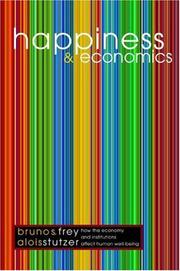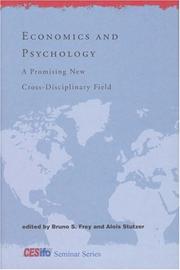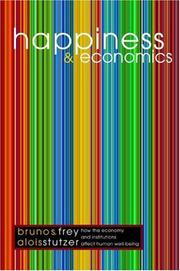| Listing 1 - 10 of 15 | << page >> |
Sort by
|
Digital
Abstract | Keywords | Export | Availability | Bookmark
 Loading...
Loading...Choose an application
- Reference Manager
- EndNote
- RefWorks (Direct export to RefWorks)
Sociology of the family. Sociology of sexuality --- Sociology of work --- Switzerland

ISBN: 0691069972 0691069980 9786612964411 1400829267 1282964410 9781400829262 9780691069982 Year: 2001 Publisher: Princeton: Princeton university press,
Abstract | Keywords | Export | Availability | Bookmark
 Loading...
Loading...Choose an application
- Reference Manager
- EndNote
- RefWorks (Direct export to RefWorks)
Curiously, economists, whose discipline has much to do with human well-being, have shied away from factoring the study of happiness into their work. Happiness, they might say, is an ''unscientific'' concept. This is the first book to establish empirically the link between happiness and economics--and between happiness and democracy. Two respected economists, Bruno S. Frey and Alois Stutzer, integrate insights and findings from psychology, where attempts to measure quality of life are well-documented, as well as from sociology and political science. They demonstrate how micro- and macro-economic conditions in the form of income, unemployment, and inflation affect happiness. The research is centered on Switzerland, whose varying degrees of direct democracy from one canton to another, all within a single economy, allow for political effects to be isolated from economic effects. Not surprisingly, the authors confirm that unemployment and inflation nurture unhappiness. Their most striking revelation, however, is that the more developed the democratic institutions and the degree of local autonomy, the more satisfied people are with their lives. While such factors as rising income increase personal happiness only minimally, institutions that facilitate more individual involvement in politics (such as referendums) have a substantial effect. For countries such as the United States, where disillusionment with politics seems to be on the rise, such findings are especially significant. By applying econometrics to a real-world issue of general concern and yielding surprising results, Happiness and Economics promises to spark healthy debate over a wide range of the social sciences.
Microeconomics --- Economic order --- 330.1 --- emoties --- gedrag --- psychologie, sociaal --- sociale economie --- Economische grondbegrippen. Algemene begrippen in de economie --- Economics --- Happiness --- Well-being --- 330.1 Economische grondbegrippen. Algemene begrippen in de economie --- Welfare (Personal well-being) --- Wellbeing --- Quality of life --- Health --- Wealth --- Gladness --- Emotions --- Cheerfulness --- Contentment --- Pleasure --- Behavioral economics --- Behavioural economics --- Psychological aspects --- Economic aspects --- E-books --- 313 --- 330.580 --- 338.8 --- 339.21 --- AA / International- internationaal --- Levenswijze en levensstandaard. Levensminimum. sociale indicatoren (Studiën) --- Gecontroleerde economie. Geleide economie. Welvaarststaat. Algemeenheden --- Economische groei --- Ongelijkheid en herverdeling van vermogens en inkomens. Inkomensbeleid --- Well-being. --- Economic aspects. --- Psychological aspects.

ISBN: 0262514168 9780262514163 9780262062633 0262062631 9786612098888 0262273195 1282098888 1429480297 9780262273190 9781429480291 9781282098886 6612098880 Year: 2007 Publisher: Cambridge: MIT Press,
Abstract | Keywords | Export | Availability | Bookmark
 Loading...
Loading...Choose an application
- Reference Manager
- EndNote
- RefWorks (Direct export to RefWorks)
Leading economics scholars consider the influence of psychology on economics, discussing topics including pro-social behavior, conditional trust, neuroeconomics, procedural utility, and happiness research.
Economics --- Psychological aspects. --- Behavioral economics --- Behavioural economics --- Economic order --- Psychological aspects --- ECONOMICS/Microeconomics --- COGNITIVE SCIENCES/Psychology/General --- consumentengedrag --- psychologie, bedrijven --- psychologie, sociaal --- 159.9 --- Psychologie --- Economics - Psychological aspects
Book
ISBN: 9781781953822 1781953821 Year: 2015 Volume: 271 Publisher: Cheltenham: Elgar,
Abstract | Keywords | Export | Availability | Bookmark
 Loading...
Loading...Choose an application
- Reference Manager
- EndNote
- RefWorks (Direct export to RefWorks)
Economics --- Happiness --- Psychological aspects --- AA / International- internationaal --- 313 --- 330.580 --- 339.21 --- 15 --- Levenswijze en levensstandaard. Levensminimum. sociale indicatoren (Studiën) --- Gecontroleerde economie. Geleide economie. Welvaarststaat. Algemeenheden --- Ongelijkheid en herverdeling van vermogens en inkomens. Inkomensbeleid --- Psychologie --- Economics - Psychological aspects
Digital
Abstract | Keywords | Export | Availability | Bookmark
 Loading...
Loading...Choose an application
- Reference Manager
- EndNote
- RefWorks (Direct export to RefWorks)
Digital
Abstract | Keywords | Export | Availability | Bookmark
 Loading...
Loading...Choose an application
- Reference Manager
- EndNote
- RefWorks (Direct export to RefWorks)
Book
Abstract | Keywords | Export | Availability | Bookmark
 Loading...
Loading...Choose an application
- Reference Manager
- EndNote
- RefWorks (Direct export to RefWorks)
Book
Year: 2004 Publisher: Universität Zürich. Institut für empirische Wirtschaftsforshung
Abstract | Keywords | Export | Availability | Bookmark
 Loading...
Loading...Choose an application
- Reference Manager
- EndNote
- RefWorks (Direct export to RefWorks)
This paper analyzes the causal relationships between marriage and subjective well-being in a longitudinal data set spanning 17 years. We find evidence that happier singles opt more likely for marriage and that there are large differences in the benefits from marriage between couples. Potential, as well as actual, division of labor seems to contribute to spouses well-being, especially for women and when there is a young family to raise. In contrast, large differences in the partners educational level have a negative effect on experienced life satisfaction.

ISBN: 9781400829262 9780691069982 Year: 2010 Publisher: Princeton, N.J. Princeton University Press
Abstract | Keywords | Export | Availability | Bookmark
 Loading...
Loading...Choose an application
- Reference Manager
- EndNote
- RefWorks (Direct export to RefWorks)
Digital
Year: 2009 Publisher: Munich CESifo
Abstract | Keywords | Export | Availability | Bookmark
 Loading...
Loading...Choose an application
- Reference Manager
- EndNote
- RefWorks (Direct export to RefWorks)
| Listing 1 - 10 of 15 | << page >> |
Sort by
|

 Search
Search Feedback
Feedback About UniCat
About UniCat  Help
Help News
News